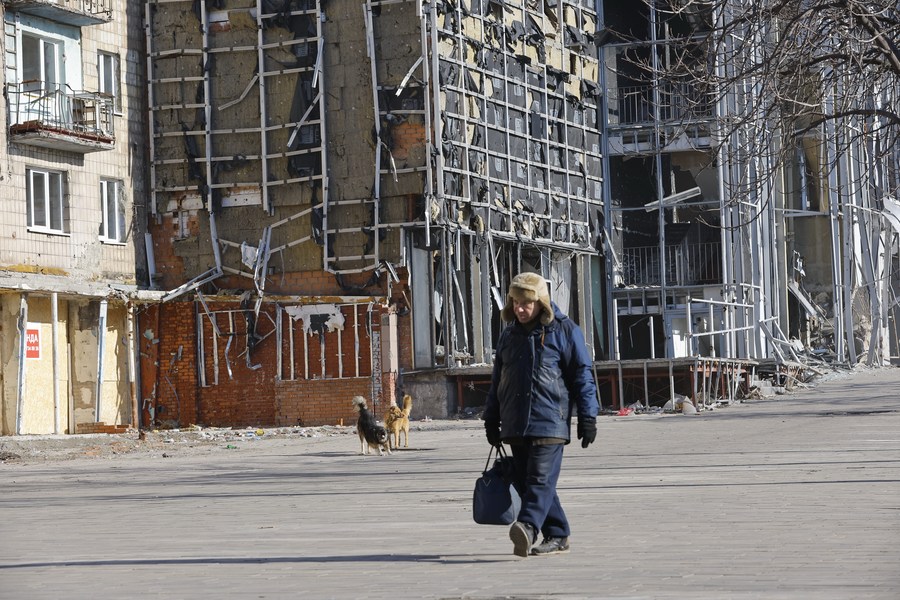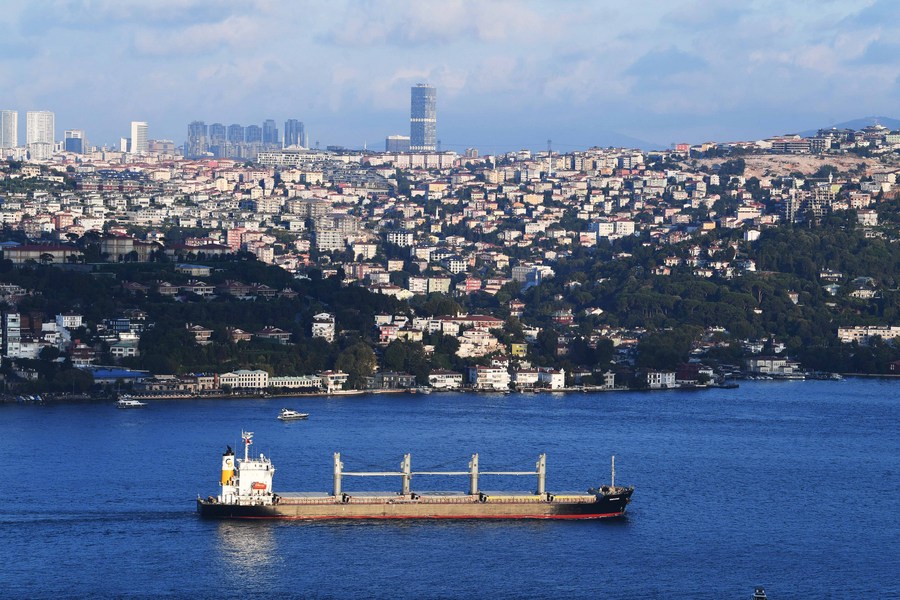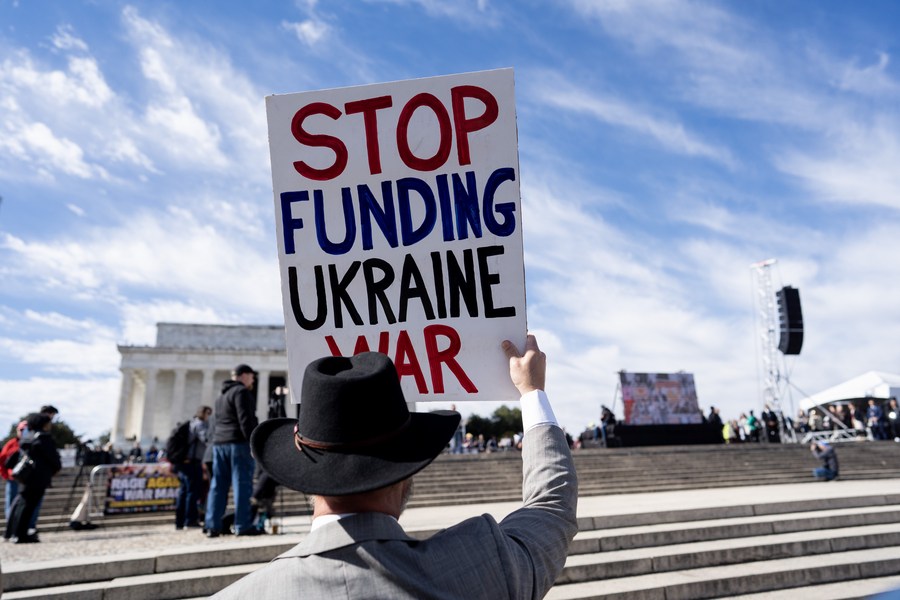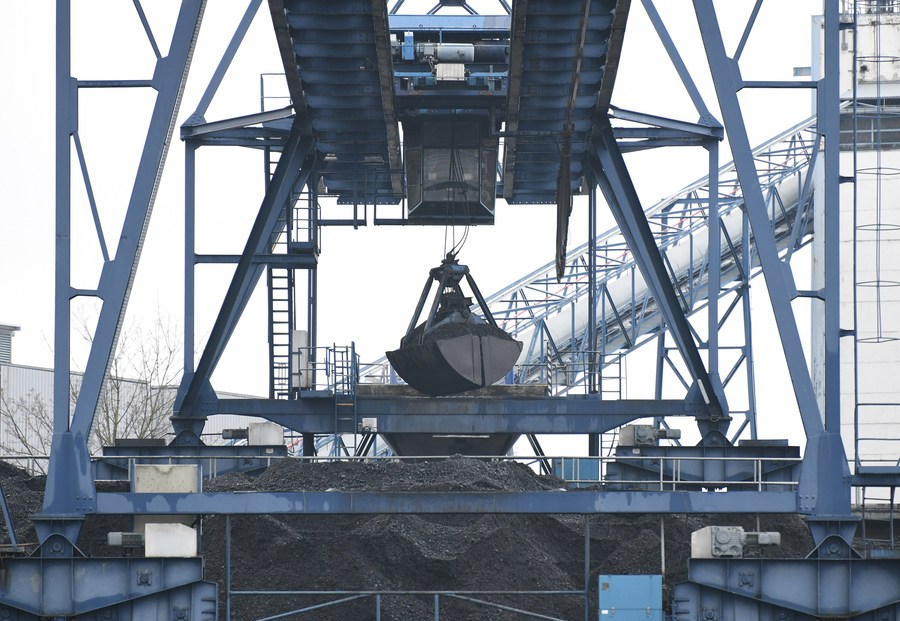


A man walks past damaged buildings in Mariupol, Jan. 27, 2023. (Photo by Victor/Xinhua)
European politicians are learning from their U.S. friends business lesson 101: never mix friendship and business. Ditto for developing countries.
by Xinhua writer Guo Yage
BEIJING, Feb. 21 (Xinhua) -- It's been almost a year since Russia launched a special military operation against Ukraine, but the conflict is far from over.
The Ukraine crisis began on Feb. 24, 2022, following incitement from the United States and its allies due to NATO's eastward expansion. Today, Ukrainians and Russians still grieve their beloved ones killed on the frontlines. When the conflict is piling misery on people worldwide suffering from acute food and energy crises, the West continues to fan the flames by sending more military hardware and intelligence to Ukraine.

Ukrainian people move towards a border crossing at the border area between Ukraine and Poland. (Xinhua/Ren Ke)
FIRST ANNIVERSARY
The battlefield has been brutal and bloody. Tens of thousands of troops on both sides have been killed, and millions of others were forced to flee their homes.
But the echoes of the conflict are heard far beyond Ukraine's borders. Its heavy tolls on the world manifest through a changing landscape of regional and global security, featuring food supply chain disruptions, skyrocketing energy prices and soaring inflation.
After the escalation of the Ukraine crisis, the United States and its allies imposed sanctions on Russia in hopes of choking the country's energy export channels and destroying its economy. However, those sanctions have backfired, hurt U.S. allies and triggered a worldwide energy crisis.
Adding to the problem were the explosions of the Nord Stream pipelines carrying gas from Russia to Europe. In a Feb. 8 article on the U.S. portal Substack, Pulitzer Prize winner Seymour Hersh said the United States partnered with Norway in a top-secret operation in June 2022 to plant remotely triggered explosives that took out three of the four Nord Stream pipelines three months later.
Ukraine and Russia jointly produce around 30 percent of the world's wheat exports. Russia is also one of the world's biggest exporters of fertilizers. The impact of the conflict between the two countries on food supply chains has contributed to rising food prices, making it harder for people in lower and middle-income economies to afford to feed their families.

A vessel transporting grain from Ukraine passes through the Bosphorus Strait in Istanbul, Türkiye, Aug. 7, 2022. (Xinhua/Shadati)
According to the UN Food and Agriculture Organization, the food price index hit 159.7 points in March last year, the highest since 1990. UN Secretary-General Antonio Guterres said in June 2022 that fertilizer prices have risen by more than 50 percent, and energy prices have risen by more than two-thirds, putting pressure on farmers across Asia, Africa and the Americas.
To make things worse, the United States and its allies have sent more weapons to Ukraine. Since Feb. 24, 2022, the United States has promised nearly 30 billion U.S. dollars in military assistance to Ukraine. In late January, the United States and Germany pledged tanks to Ukraine. The Pentagon announced a new tranche of military aid for Ukraine days later, including long-range precision rockets for the first time.
The United States "is ready to fight to the last drop of Ukrainian blood, in the end, it's prepared to fight to the last drop of European blood," said former British MP George Galloway.
"In the past year, increasing sanctions and upgrading weapons did not calm the situation, but instead made the conflict more acute and issues more complicated, pushing the situation to a more dangerous precipice," said Dai Bing, China's deputy permanent representative to the United Nations, stressing dialogue and negotiation are the fundamental way out to end the conflict and restore peace.

This photo taken on April 6, 2022 shows a sculpture and flags at NATO headquarters in Brussels, Belgium. (Xinhua/Zheng Huansong)
UGLY TRADITION
"We lied, we cheated, we stole. We had entire training courses. It reminds you of the glory of the American experiment," former U.S. Secretary of State Mike Pompeo, once director of the CIA, said in 2019.
The intelligence field is not the only place the United States practices this ugly tradition it prides itself on. Breaking a promise made at the end of the Cold War that NATO would not expand to the east, the U.S.-led bloc has expanded eastward five times since 1999, advancing more than 1,000 km to the Russian border. Its membership has increased from 16 to 30 countries.
The deep cause of the Russia-Ukraine conflict is the expansion of NATO, and "the Russians are reacting to the West's attempt to make Ukraine a western bulwark on Russia's border," John Mearsheimer, political science professor at the University of Chicago, told Xinhua.
The United States and its European allies want to make Ukraine a member of NATO and the West, he said. "From the Russian point of view, this is categorically unacceptable. It represents an existential threat, and that is what has precipitated the crisis."
To secure military hegemony, successive U.S. governments have been willful in unilaterally withdrawing from international treaties concerning arms control, disarmament and non-proliferation processes, like the Anti-Ballistic Missile Treaty, the Intermediate-Range Nuclear Forces Treaty and the Treaty on Open Skies.
The United States has also initiated "color revolutions" in the post-Soviet space, including Ukraine, stirring up geopolitical tensions in Eurasia. What awaited a West-leaning Ukraine was never rapid development but industrial collapse, economic recession and brain drain. For example, the Black Sea Shipyard, a facility in Ukraine's Mykolaiv region that built all the aircraft carrying USSR and Russian ships, was declared bankrupt in 2018.
"We don't care how many Ukrainians die. How many women, children, civilians, military will die. We do not care. It's like a great football game, and we want to win," former U.S. senator Richard Black said last year.

A demonstrator holds a slogan during the anti-war rally in Washington, D.C., the United States, Feb. 19, 2023. (Xinhua/Liu Jie)
BIG DEAL
The United States has not been a superpower trying to "introduce goodness into the world. It follows its own interests," Michael Lueders, a well-known German writer, told Xinhua back in 2021.
Lueders' finding still rings true today. The Ukraine crisis puts ordinary folks worldwide through dire straits while Uncle Sam's war business flourishes.
"Big Oil just reported its profits. Record profits. Last year, they made 200 billion dollars in the midst of a global energy crisis," U.S. President Joe Biden admitted in his State of the Union Address on Feb. 7.
"American gas is three to four times cheaper on the domestic market than the price at which they offer it to Europeans. These are double standards," French President Emmanuel Macron said in October 2022.
Data from the U.S. Energy Information Administration showed that the United States became the world's largest liquefied natural gas (LNG) exporter during the first half of 2022. Business Insider, a U.S. financial and business news website, revealed that U.S. companies make over 100 million dollars per LNG carrier bound for Europe.
ExxonMobil posted a 56-billion-dollar profit for 2022, taking home around 6.3 million dollars an hour last year and setting an annual record not just for itself but for any U.S. or European oil giant.

Loading equipment operates at a coal yard of a thermal power plant in Berlin, Germany, Jan. 9, 2023. (Xinhua/Ren Pengfei)
The United States is also plundering Europe's burning house to make money. The U.S. Inflation Reduction Act, which includes green incentives and tax breaks for companies producing in the United States, has hurt Europe badly. As more European companies are tempted to produce in the United States, Europe's green plan has suffered significant setbacks.
Meanwhile, U.S. food giants are having a rake-off from soaring food prices. Family members of Cargill, one of the largest privately held U.S. global food companies, have seen their personal fortunes grow by a fifth since the start of 2022, reaching about 5.4 billion dollars each.
America's notorious military-industrial complex isn't fairing too badly either. Lockheed Martin, the world's top weapons manufacturer, saw its stock price surge by 28 percent from 354 dollars in early January 2022 to 453 dollars on March 25 last year. "The neocons/warmongers have spent years stoking the new Cold War with Russia and have now brought us to the brink in Ukraine -- this serves their own interests and lines the pocket of the Military Industrial Complex with trillion dollars," former U.S. Congresswoman Tulsi Gabbard said last February.
European politicians are learning from their U.S. friends business lesson 101: never mix friendship and business. Ditto for developing countries.
Africa "does not want to be the breeding ground of a new Cold War," Senegalese President Macky Sall said in September 2022, calling for "a de-escalation and a cessation of hostilities in Ukraine." ■
点击右上角![]() 微信好友
微信好友
 朋友圈
朋友圈

请使用浏览器分享功能进行分享
